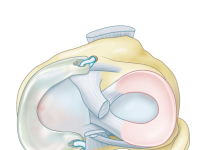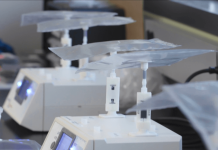Tulyp Medical has emerged from stealth with its pressure-driven perfusion system for vascular procedures and submitted a 510(k) application with the US Food and Drug Administration (FDA) for the technology.
Borne out of Sofinnova Partners’ MedTech accelerator, Sofinnova MD Start, the France-based medical device company’s system is designed for the oxygenation of tissue that may otherwise be obstructed and lead to complications including amputations or death.
Perfusion systems often focus on monitoring flow when delivering oxygenated blood. However, Tulyp’s system is focused on controlling blood pressure, since 120/80mmHg is considered the general benchmark for normal vascular blood pressure.
Related: RevealDx won MDR certification for AI-Powered lung nodule decision support
By taking advantage of this often-discounted biological factor, Tulyp’s CEO Mano Iyer explained that the company’s technology aims to optimise oxygen delivery and reduce variability during vascular procedures.
Iyer told Medical Device Network: “Between two individuals of vastly different heights, there’s a difference in what they need if you were to provide flow, but if you provide patients with perfusion based off of 120/80mmHg, a pressure the body readily understands, then their bodies can demand what they need.
“This need varies greatly between patients and across them, and we started seeing this with the initial work we undertook. Pressure is in a constant state of flux in all of us at any given point in time.”
Ahead of filing its 510(k) application with the FDA, Tulyp completed a first-in-human use of its system during a routine leg artery bypass surgery, in which it helped stabilise blood pressure and improve oxygenation.
Tulyp explained that it sought FDA clearance first, given that the 510(k) pathway allows applications to be based on an existing approved system – a framework that doesn’t exist in Europe when applying for a CE marking.
Iyer added: “That process for CE mark, with the current system we have, would be far more time and cost consuming and a longer process, so that’s something we are keeping for another phase.”
The initial work towards Tulyp’s FDA filing has been funded out of a previous Sofinnova fund. Iyer and a team including Tim Lenihan, Tulyp’s co-founder and chief operating officer; and cardiologists Dr Navin Kapur and Dr Richard Karas, previously founded preCARDIA in 2017. The startup developed a catheter designed for intermittent occlusion of the superior vena cava (SVC) to treat acute decompensated heart failure (ADHF), andwas later acquired by Johnson & Johnson’s Abiomed in 2021.
Looking ahead, Tulyp plans to initiate a Series A funding round, with plans to initially spend future funds towards clinical and R&D.
Iyer concluded: “As all technologies and previous companies we’ve developed have done, we want to get more clinical data and build off of what we started. As you capture more clinical data, that informs larger studies, which ultimately helps convince the clinical community and payors to justify reimbursement for these types of technologies.”




